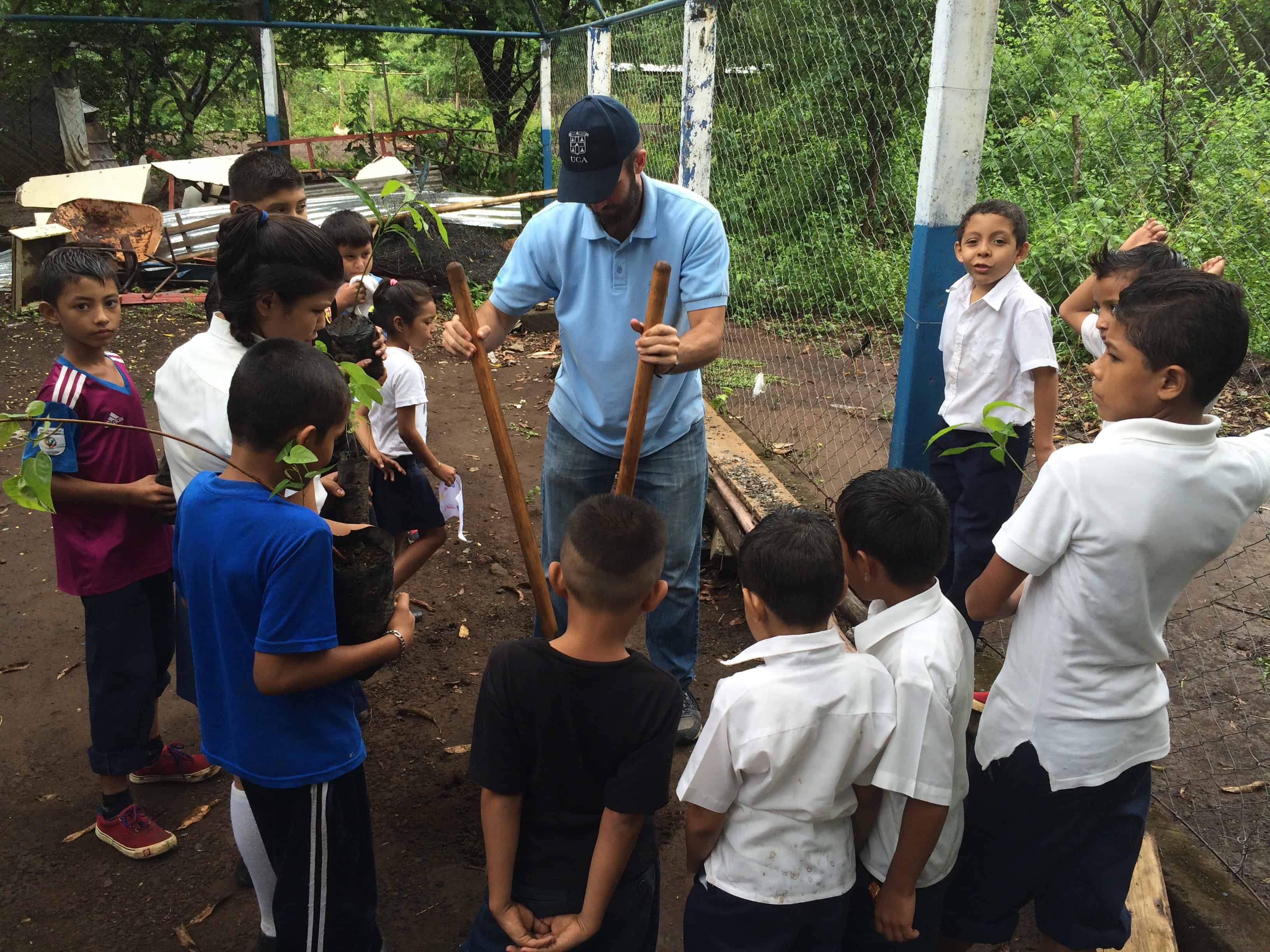I was prepared for an ordinary workday in the field. I was dressed in nice jeans, comfortable shoes, my work polo and matching hat.
Five months into my job at the Roncalli Association-John XXIII, I had adapted to the rhythm. Part of the week was typically spent in our Managua office to arrange activities and keep up with the requisite reports. But the highlight of the job was the days spent out in the field with beneficiaries of our development projects in one of the various municipalities across Nicaragua.
This day, I was heading to Tipitapa, a semi-urban municipality located 20 miles up the highway from Managua. A few weeks prior, I had visited the local cooperative there to help run a one-day workshop on the papal encyclical Laudato Si’ about care for the environment. At the end of the workshop, participants developed a series of commitments to improve their local surroundings, including a plan to reforest the area along a local drainage canal. I was heading to Tipitapa with a co-worker this morning to plan the details of the reforestation project.
Or so I thought.
¿Por qué estás vestido así?
“Why are you dressed like that?” asked my puzzled co-worker, Gladis.
Porque vesto así cada vez que salimos de la oficina. ¿Qué pasa?
“Because I wear this every time we work outside the office. What’s up?”
Vas a morir en este calor y ensuciar tu camisa institucional. ¡Tenemos doscientos árboles de sembrar!
“You’re going to die in this heat and get your work polo all dirty. We have two hundred trees to plant!”
Um, excuse me? Two hundred trees to plant? Today?!? I thought we were planning the reforestation project, not, you know…doing it!
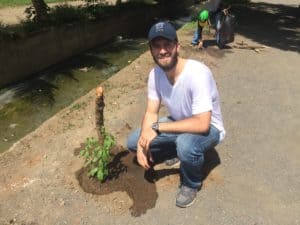
This was not a simple mix-up on my part. Gladis and I had spoken about this day several times. She had, to her knowledge, been very clear of the plan. But I had missed something in the conversation, because (did I mention this?) all our conversations are in Spanish. Despite two months of language studies and five months of daily practice on the job, I was still struggling with communication in a second language. And it was rarely as clear as that day in Tipitapa.
The cooperative members broke into laughter as Gladis recounted my misunderstanding. Frustrated with myself and embarrassed, I peeled off my work polo to spend the day planting trees in the sun in my sweat-stained white undershirt and heavy jeans.
Welcome to the deep dive of cross-cultural immersion.
*****
Before my life as a Jesuit, I had spent time working abroad in South Africa. The experience impacted me in a variety of ways: it not only triggered my vocational discernment but it also inspired an interest in international development.
When I was sent to study at Fordham University as part of my Jesuit formation, a unique opportunity presented itself to further explore this interest. After a year of Philosophy studies, I enrolled in Fordham’s master’s degree program in International Political Economy and Development, or IPED. The degree tackles questions like why some countries have so much and others so little, and what political and economic factors contribute to these inequalities.
It was the perfect degree for my background and interest.
As I wrapped up the degree, it was time for the next stage of Jesuit formation, called regency, when a Jesuit spends a few years working in apostolic ministry. Most Jesuits spend these years in one of our many educational institutions, typically as teachers. In my case, with the IPED degree, I was sent to live and work in Managua, Nicaragua, for the Roncalli Association-John XXIII, a Jesuit-sponsored development organization.
On the one hand, I was thrilled. I loved my international experience in South Africa, which had helped guide me to religious life in the first place. And the website of the Roncalli Association was enough to show me that it was exactly the type of organization I wanted to work for: It was staffed by local Nicaraguans; they had projects in housing, health, environment and micro-finance; and it was Jesuit-sponsored with a clear focus on working with the most marginalized.
On the other hand, there was one glaring problem: I didn’t speak Spanish.
*****
Not even the rigors of grad school can compare with full-time language studies. I started at a language school in Guatemala with five hours of one-on-one classes every weekday. I had arrived with a vocab of about 500 Spanish words (thanks to high school studies) and a familiarity with the present tense. My weekly vocab lists stretched into the hundreds, and the grammar lessons and verb tenses seemed endless.
This was not my dream scenario.
I continued with another month of conversation classes in Managua and then started work at the Roncalli Association. I also moved into a Jesuit community with a diverse collection of Jesuits, all of whom were native Spanish speakers. It was total immersion.
Transitions to new jobs and new cities always take time. My first semester at Fordham had been rocky, as I adjusted to living in New York and getting to know Fordham and its students. Fast forward two and a half years, and I found myself telling my Jesuit superior how comfortable I had come to feel there. I couldn’t walk around campus without running into someone I knew!
Contrasting that with my initial challenges of when I first arrived at Fordham, my sage superior commented that it is, in fact, unremarkable that we feel unsettled and disconnected when we transition to somewhere new. That is perfectly natural. What is remarkable is that somehow, after just a couple of years, we can come to feel so integrated and connected to a place.
These words sunk in deeply, and I came to depend on them as I entered into my experience in Nicaragua. It was perfectly unremarkable that I was struggling there. Along with all the typical challenges of transition, I was also learning a new language. How could I expect myself to feel connected and integrated when I was still communicating like a seven-year old?
*****
The deep dive of cross-cultural immersion commonly evokes “culture shock.” (Wait, the rest of the world doesn’t function exactly like it does where I’m from?!?) But the layers of cultural difference go much deeper than the surface-level, and culture shock is nothing to dismiss. I have heard it described like an iceberg: 90 percent of the differences are hidden below the surface.
The obvious differences between the U.S. and Nicaragua (as with other countries) are things like language, food, folk music and dancing. Even a tourist on a weeklong trip can identify these differences. But the longer you spend somewhere, the more you become aware of the deeper differences. While language was my principal challenge in adjusting to Nicaragua, several other cultural differences emerged over time.
For example, Nicaraguans are more communally-oriented and less individualistic. To avoid overgeneralizing, let me offer a concrete experience of how this difference manifested itself to me.
One day at work, I was heading out of the office with a few co-workers. We were headed to the remote rural community of San Dionisio, about a two and a half hour trip from Managua. We were going to be leaving early in the morning and returning late. As a good Eagle Scout, I came prepared: I woke early enough to eat a good breakfast, I filled my water bottle, and I packed an energy bar in case I got hungry.
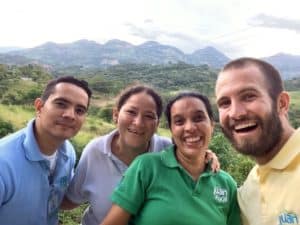 About an hour into our ride, one co-worker opened her bag and pulled out a bunch of breakfast cakes. She passed them around for everyone to share. My two other co-workers followed suit: they had each brought some food to share with the group. As they handed me a pile of food, I looked at my meager energy bar. How was I going to divide this four ways?
About an hour into our ride, one co-worker opened her bag and pulled out a bunch of breakfast cakes. She passed them around for everyone to share. My two other co-workers followed suit: they had each brought some food to share with the group. As they handed me a pile of food, I looked at my meager energy bar. How was I going to divide this four ways?
My focus was individualistic: “I’ll take care of me; you take care of you.” Meanwhile my co-workers were instinctively thinking communally: “We’re all going to be in that truck all day, so I better bring some food for us to share.”
*****
My tendency in cross-cultural immersion is to think of my particular cultural experience in the United States as more enlightened than the local culture. In some cases, this disposition is not entirely misplaced. When a Nicaraguan uses a slang term for “gay” to make fun of another person, or a group of guys in a truck make cat calls at a young woman on the street, I can’t dismiss these things as “cultural misunderstandings.” They are simply offensive, whether they occur in the U.S., Nicaragua or elsewhere.
Butting into these cultural incongruities is draining and often disheartening. I was dismissed by a group of friends when I was explaining how calling someone “gay” in a derogatory way was offensive. “When it’s between friends,” they protested, “it’s funny.” They thought I just didn’t get their sense of humor. But this sort of humor shouldn’t be accepted in any context.
In other cases, my sense of American cultural exceptionalism is steeped in arrogance. Nicaraguan culture is much more formal. As someone more accustomed to calling priests and professors by their first name, I tend to dismiss such formalities as outdated. This is shortsighted.
Nicaraguans show a great deal of respect and deference to the elderly and the educated. My co-workers sign their names in email signatures with their college degree: “Lic. Name” for those with a bachelor’s degree, “Msc. Name” for those with a master’s, “Ing. Name” for engineers. A Nicaraguan would never use the informal second person (tu or vos) with a boss or someone a generation older. They would always use the more formal “usted.”
Who am I to dismiss this? This is not a less-enlightened vestige of past generations. This is a cultural reality that corresponds with underlying values. It deserves my sensitivity and attention.
Over time, I was discovering that there was a lot more to learn in Nicaragua than just Spanish.
*****
A deep dive is not easy. In my first months in Nicaragua, I found it isolating. I couldn’t keep up with group conversations. I couldn’t chime in spontaneously. My jokes never hit. I didn’t feel like myself.
I started wondering what my community members thought of me. Was I a shy and quiet guy who didn’t have much to contribute and never joked around? Such a description would never come from a long-term friend of mine, but it pretty accurately describes my first months in my Managua community.
Suddenly I was terrible at things I had prided myself at being good at, like public speaking, chatting up strangers and spontaneous prayer. It was as if I was developing a second personality: Brian, the quiet and timid Spanish-speaker, who seemed quite unlike Brian, the charismatic English-speaker.
I remember sitting at a crowded table at a social event one night and feeling awkward about the silence. Normally, I would jump in with a question to the group or a comment to elicit conversation. In this case, I thought silently to myself, “Improving this situation is NOT my responsibility.” We continued to eat in silence.
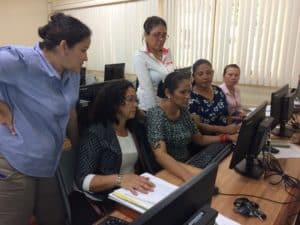 At work, I was learning the ropes while collaborating with a very capable team of co-workers. I was not inherently good at my job. My master’s degree was a pretty piece of paper that paled in comparison to the knowledge gained from years of work experience, not to mention the cultural acumen inherent to local Nicaraguans working in their own country.
At work, I was learning the ropes while collaborating with a very capable team of co-workers. I was not inherently good at my job. My master’s degree was a pretty piece of paper that paled in comparison to the knowledge gained from years of work experience, not to mention the cultural acumen inherent to local Nicaraguans working in their own country.
I was asked on one of my first days of work to make invitations for a forum on the environment. I returned to my desk, stared at my computer and asked what that even means in a country that doesn’t have street addresses or a postal service. Do I order them? Or make them and print them? Any Nicaraguan would know exactly what to do. I had to retreat right back into my boss’s office and ask, “So…how exactly do I make invitations?”
*****
Amid the challenges and frustrations, I looked for ways to cope and survive. On an almost nightly basis, I called friends and family members back in the U.S. to have conversations in English. I watched a lot of American TV on Netflix. I sought out English-speaking friends.
This wasn’t the vision I had when I first arrived in Nicaragua. I had seen myself spending nights watching soap operas, soccer games and local news programs with the Central American Jesuits in my community. I was going to find a fun Nicaraguan peer group to socialize with on weekends.
But amid the daily struggle of adjusting to a new language and culture, what I needed most was familiarity and comfort. If I was going to be a good community member and productive contributor at work, I needed things that would fill my tank and not just drain me of energy.
Over time, I started to find ways to integrate and connect with local friends. I had my co-worker Gladis make me a playlist of some of her favorite Spanish-language pop songs. It became a workday routine for me to play Julieta Venegas’s “Me Voy” (“I’m going”) when 5:00 p.m. came around.
I joined a workplace basketball team. We made jerseys and entered a local league. While I still found myself yelling frustrations and cursing on the court in English, it was a great way to connect with peers while also releasing built-up tension through exercise and sport.
These were little things, but they went a long way to making me feel more comfortable and more connected. The little things never mattered so much.
*****
I also prayed. A lot. My most fervent prayer was that time would move quicker. I knew that learning a language and culture is a slow and gradual process, but improvement and comfort increase over time. “If I could just skip ahead a few months, things will get easier!” I would pray.
I was drawn to a well-known prayer by the Jesuit paleontologist Pierre Teilhard de Chardin called Patient Trust.
“We are quite naturally impatient in everything
To reach the end without delay.
We should like to skip the intermediate stages.”
Yes! Let’s skip over these intermediate stages of language acquisition and cultural adaptation.
“And yet it is the law of all progress
That it is made by passing through
Some stages of instability—
And that it may take a very long time.”
And it did feel like it took a long time. Although I prayed for time to speed up, it felt like it slowed down. My first year in Nicaragua felt like the longest year of my life. It crawled.
“Above all, trust in the slow work of God….
Give Our Lord the benefit of believing
That his hand is leading you,
And accept the anxiety of feeling yourself
In suspense and incomplete.”
God was indeed at work. The reality is that if you want to grow you have to step outside of your comfort zone and challenge yourself. The deep dive of cross-cultural immersion is a big step into the territory of personal growth.
As a pious young Jesuit, I often prayed to grow in humility. But be warned: When you pray to God for a grace, God doesn’t just wave a magic wand and grant you what you asked for. God offers you an opportunity to grow into that grace. God didn’t just (POOF!) grant me humility. God sent me to Nicaragua to grow in it.
*****
C.S. Lewis wrote that a truly humble person “will not be thinking about humility: he will not be thinking about himself at all.” My immersion experience had turned much of my attention inward. I spent A LOT of time thinking about myself: my struggles, my weaknesses, my language, my culture. Me. Me. Me.
The people of Nicaragua have helped break that habit. I encountered people on a daily basis who were facing tremendous challenges in life and who were struggling through every effort to overcome them.
I met Blanca, who recovered from cancer to become a leader of her cooperative. She helped pioneer a partnership with the Jesuit university for her cooperative to run a food stand on campus three days a week to sell lunch and refreshments to students.
I met Juan José, an uneducated campesino farmer, who diversified his crops and adopted new techniques to avoid plagues and multiply his crop yield.
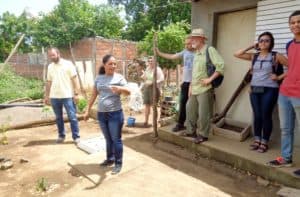 I met Sara, who has spent the last seven years working with a housing cooperative to get access to land and funds to build homes for themselves. They still haven’t found funding, so they continue to rent or live with family. But this year she joined our environmental and business development projects, and now she has a blossoming vegetable garden and a small business run out of her aunt’s house where she currently lives.
I met Sara, who has spent the last seven years working with a housing cooperative to get access to land and funds to build homes for themselves. They still haven’t found funding, so they continue to rent or live with family. But this year she joined our environmental and business development projects, and now she has a blossoming vegetable garden and a small business run out of her aunt’s house where she currently lives.
It doesn’t matter if I mix up verb tenses when I am talking with them, or slip into informal pronouns when a formal one would be more appropriate. These language and cultural differences do not carry as much weight when you develop personal relationships. People are people, and love and generosity come before judgement and condescension.
*****
We are at our best when we let go of expectations and embrace who we can be. When I have prayed with the frustration of not feeling like myself in Spanish, I have realized that I need to let go of some things, like public speaking, where I excel in English but not in Spanish. Instead, I need to turn my attention to things that I can do in any language or cultural context.
I can laugh. Including at myself. Who cares if I dressed wrong for reforestation day? Why get frustrated and embarrassed? What good does that do? Why not just laugh it off?
I can pray. To grow in the graces I seek and to turn my focus to those in need. In prayer, I can spend more time with Blanca, Juan José and Sara, lifting up their needs and intentions and placing them before the Lord. I can accept my own limitations and let the Lord work through me.
I can love. I can support those in need and offer encouragement. I can be present, even when my contribution is understated or in the background. A smile or a hug can often convey more than words can.
*****
“The world is a book, and those who do not travel read only a page.”
It is a great privilege to take the deep dive of cross-cultural immersion. It is a powerful way to broaden your horizons and step outside of your comfort zone. It is too challenging for some to undertake, and inaccessible for many others. I recognize with humility the great privilege I have of spending these years in Nicaragua.
That, of course, does not mean it is easy. The deep dive can be isolating and lonely. It can stretch and pull you in ways you never knew you could be stretched and pulled. You can feel far from home, and sometimes even far from yourself.
But it is worth it — Oh, is it worth it! — for we do not go alone. God’s hand is guiding us. God’s face is revealed to us in those whom we encounter. God is there, working in us and through us.
Above all, we must trust in the slow work of God.

